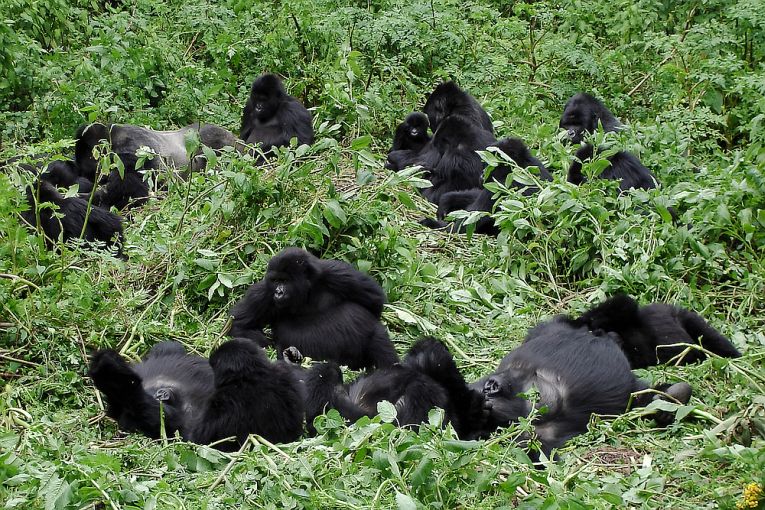guysare just hanging out together as mountain gorillas do when they’re just plumb-full of food and fed up with tourists watching them! The deeper problem is whether we allow a vast diversity of wildlife to disappear or let oil companies continue their parade of destructive interference and leaks.
Gorilla beringei beringei image; Credit: © Shutterstock
Fishermen, conservationists, local people and climate change campaigners are worried. Under the great Lake Edward in Virunga National Park, DR Congo, lie huge reserves of oil. This largest national park in Africa also has the most wildlife diversity. However, the DRC President, Matata Ponyo, has just declared that he will change the boundaries to allow the old enemy, London-based oil company SOCO, in the UK, to explore again. UNESCO are to be consulted, as Virunga is a World Heritage Site. It is likely SOCO will now return to the scene of its withdrawal last year, under the weight of protests worldwide and /or sell its rights to exploit the mineral rights beneath the Park. Here is our news of their withdrawal under a year ago, with a mass of information and video from Virunga National Park itself.
Seismic exploration of the geology near Lake Edward produced evidence f the oil reserves. With grave problems and conflicts in the eastern part of the country, the President would like to find the middle-ground
to exploit the rich resources, but retain some conservation elements. That has often proved impossible in these rainforests, both in South America, and in tropical Asia. Destruction begins with the oil facilities and then the infrastructure splits up the region with roads and rail to exploit the resources as quickly as possible. Given the price of oil and the drop in fossil fuel use that seems probably to continue, the whole argument may become a simple storm in a teacup.
However, in the Nyakakoma base of SOCO from 2011, feelings are running strongly. Hundreds of fishermen there draw their living from the lake, and they and many others claim to have been intimidated by named members of the Congolese Army. 30,000 local people depend on the lake for food. There is also clear evidence that soldiers were paid nearly 4X their army salary by a South African sub-contractor of SOCO. Much of the information can be located on the BBC or similar services.
Apart from the hippopotamus, the big cats, the birds and reptiles, and the diverse insect fauna, the primates take centre stage in Virunga, The monkeys are unique in many cases, while 300 mountain gorillas, Gorilla beringei beringei, form a furry massive icing to the diversity cake. They make up 30 % of the world population, with SW Uganda and Rwanda having the rest of the species just over the mountainous border. Popularity of bushmeat, poaching of elephant and many others for various illegal purposes and the pet trade have decimated even this mighty Congolese haven for wildlife. It has been retained as the oldest national park in Africa, despite these invasions of its privacy. Now the oil could disturb its lake, its forests and those precious gorillas, even more than the terrible rebel-instigated wars that have ripped its nations apart.
Given that tourism is restricted, with people frightened to penetrate these dark and dangerous forests, it is no wonder that oil is seen as an answer to all problems. It has barely helped other countries in Africa in a political sense, though. Rebels are encouraged to hit at the oil installations, or even take them over, as they can be easy targets. What is the answer for the DRC? Go ahead with oil and upset just a few thousand people, or join international efforts to control terrorism and free the park from touristic threats. Either path is dangerous, but the future for Africa as a whole must be for peace and recovery, after half a century of pure strife and mourning.










